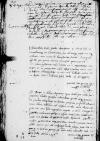List #1516
Ioannes DANTISCUS do [Kaspar HANNAU]Löbau (Lubawa), 1536-07-22
Rękopiśmienne podstawy źródłowe:
Pomocnicze podstawy źródłowe:
Publikacje:
| ||||||||
Tekst + aparat krytyczny + komentarzZwykły tekstTekst + komentarzTekst + aparat krytyczny
Salutem.
Accepi iis diebus aliquoties tuas litteras, quae mihi fuerunt text damaged⌈[nt]nt text damaged⌉ una cum libellis excussis admodum gratae, utque quantum potes, scribas frequentius, te hortor. Praeterea, si quid ad vos de novis libris adfectui ab

 BCz, 244, p. 124
BCz, 244, p. 124